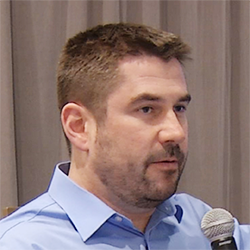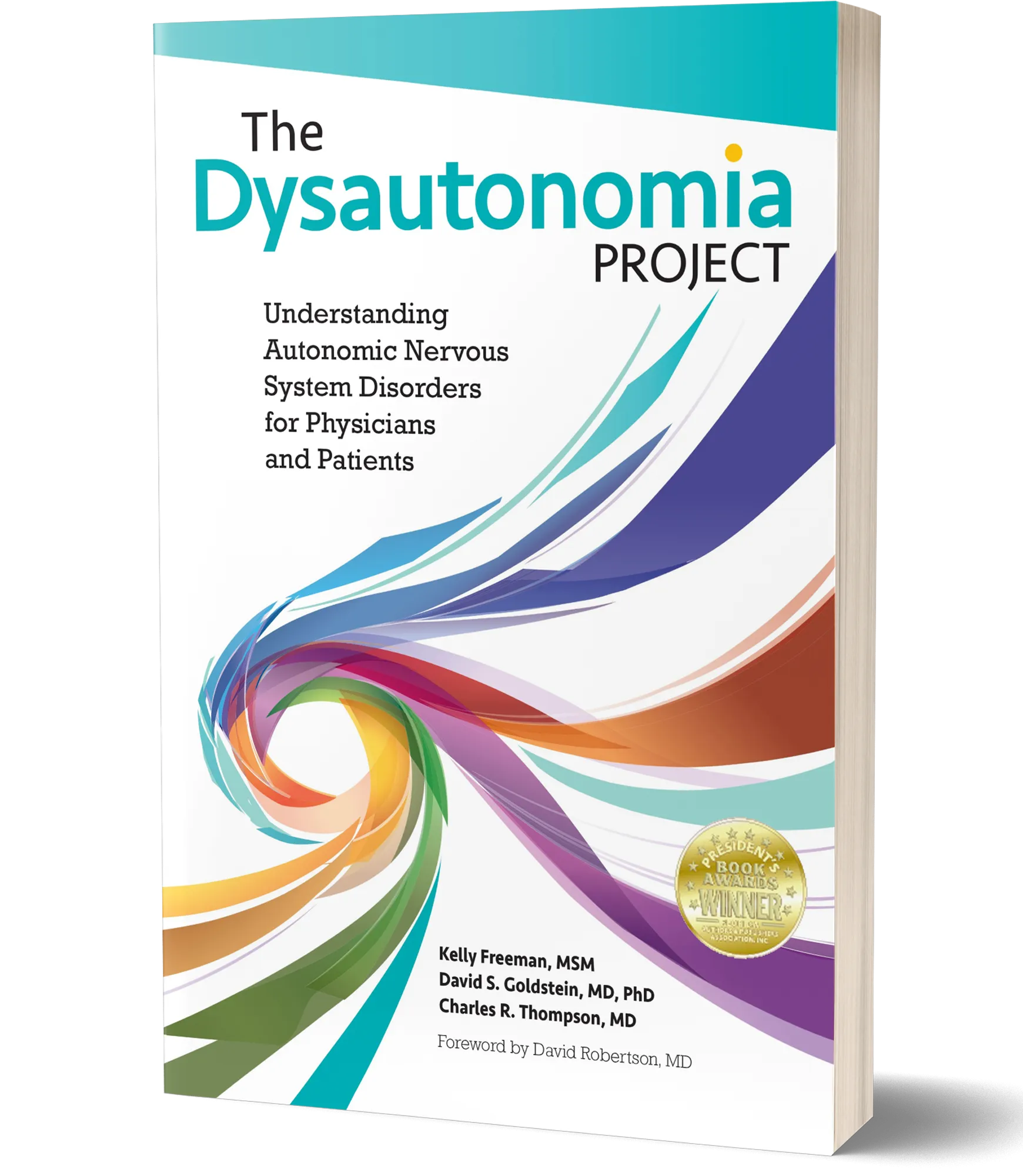Home » Dysautonomias » Autonomic Disorders in Gastroenterology and Urology Part II with G. Chelimsky, MD & T. Chelimsky, MD
Autonomic Disorders in Gastroenterology and Urology Part II with G. Chelimsky, MD & T. Chelimsky, MD
In this video Dr. Tom Chelimsky explains the autonomic signs and conditions a urologist might see in their practice. Dr. Gisela also explains how the autonomic nerves play a role. They also share an interesting analogy to better understand how the autonomic nervous system regulates the urinary and gastrointestinal tracts of the human body.
Mr. Al Ruechel: Hi everybody, I’m Al Ruechel. As we continue our discussions, looking at it more from a urologist’s perspective about how it may relate to dysautonomia and other symptoms in that general area. Joining me right now are Gisela and Tom Chelimsky. Thank you so much for joining us again. You’re in one of our other videos. So, let us just jump into it right now, what are some of the things that a urologist might see in practice that might indicate that autonomic nervous system failure or dysfunction might be related to it somehow.
Dr. Tom Chelimsky: That’s a great question and the three disorders that come to mind that a urologist may see are interstitial cystitis, the overactive bladder syndrome, and neurogenic bladder. With interstitial cystitis, the patient develops a constant bladder pain, frequency, urgency, and the urologist will tend to focus on the bladder, but there is a lot of data now to show that this is probably a brain disorder and treating this perhaps with co-treating with a neurologist or co-treating with a pain psychologist would get them much more efficacious results. So, that’s really the point about interstitial cystitis, not to try to sort of manage it from a bladder end alone but to include the brain in their thinking, particularly things like cognitive behavioral therapy.
Mr. Ruechel: Does that end up being a little bit of trial and error though, is that generally sometimes the way you look at things when you have a problem, especially with these three conditions you’re talking about right there. You go through your head and go, well let’s go through this 1, 2, 3 and then maybe it is an autonomic problem.
Dr. Tom Chelimsky: Right, so for autonomic problems, it’s important to keep them in mind and because each physician has, kind of we’ve been raised in a kind of a silo, so we focus on our organ, the cardiologist focuses on the heart, so we do not always as physicians think about what maybe the nerves or the control of the organ is the problem, as opposed to the organ itself. It’s just not our training. So, yeah, it does windup being trial and error, although I am encouraging urologists to sort of keep that on the top of their radar, so that patients don’t get delayed in diagnosis. And same, overactive bladder syndrome, very similar to interstitial cystitis, except there is really little pain, but the patients are constantly trying to get to the bathroom, they are urgent, it is very uncomfortable for them. Neurogenic bladder, typically that term is used when somebody has a known neurologic problem such as multiple sclerosis or stroke, or some structural problem that involves a spinal cord and then they have a bladder problem as a result of that, so then we say it’s a neurogenic bladder, but in fact, the treatment of those three disorders is quite similar.
Mr. Ruechel: Okay, Gisela let me ask you this, one of the things that I discovered when I’ve been interviewing some of the patients is that some of these patients, one that I talked to literally threw up everyday for 28 days straight and that, I don’t know if that’s common in all of the cases about dysautonomias, but I know that it in several, I’ve heard that same thing.
Dr. Gisela Chelimsky: So, nausea and vomiting and I would say more nausea than vomiting is very-very common and I think that when we talk about vomiting, that you are presenting here, you need to understand if it is a true vomit or if it is a rumination, or regurgitation. So, true vomiting is with a lot of retching and a big amount comes. A rumination is more like the food comes to your mouth and it’s like a mouthful that comes out without any effort, and you manage them differently; and then there is the entity of cyclic vomiting syndrome which is where people vomit for a period of time, it can be one day, can be seven days, and then they are back to baseline health and then they have another episode and then back to baseline health. Cyclic vomiting syndrome is a migraine equivalent. Now, what we are learning right now, is that people can be in status migrainosus, like half vomiting for a month which is still a migraine, although it’s not clearly described in the literature.
Mr. Ruechel: Oh, okay-okay. Now I see that…
Dr. Gisela Chelimsky: And they treat that a lot with migraine medications. So that’s in nausea, when I think about nausea which is very common in this patient…
Dr. Tom Chelimsky: I just want to emphasize on one point that you made, which is that migraine to the general public means headache, but to the doctor, there can be no headache at all. So, I just want to emphasize that cyclic vomiting syndrome is a migraine by definition, despite the fact that there’s no headache. I just want to put that out there.
Mr. Ruechel: I had no idea.
Dr. Gisela Chelimsky: There is a huge spectrum, so you can have people that have cyclic vomiting and you have on the other side, the people with severe headaches, and in between, there is an abdominal migraine. So, in cyclic vomiting, the predominant symptom is vomiting; in abdominal migraine, the predominant symptom is abdominal pain that comes in episodes; and then in the headache migraines, the predominant symptom is the headaches.
Mr. Ruechel: So, tell me again, this is interesting for me as a consumer, the autonomic nervous system controls so many things in your body and as a patient you always want to say what is it about the autonomic nervous system that is connected to the bladder and to the stomach, I mean, how does that work?
Dr. Gisela Chelimsky: The autonomic system manages every function that you don’t control voluntarily.
Mr. Ruechel: Right.
Dr. Gisela Chelimsky: So, sweating, urination, digestion, temperature control, contraction and relaxation of blood vessels, that’s all managed by the autonomic nervous system.
Mr. Ruechel: Again, I get back to this, what causes it?
Dr. Tom Chelimsky: I like to think of it a little bit by analogy to a furnace. So, you’ve got a thermostat and the thermostat you’ve got to set it and then when you set it at a temperature, if the temperature is higher, then the thermos is off and if the temperature is lower than the thermostat, then the furnace is on, and so all of our autonomic systems are obviously far more complicated than that illustration, but they’re based on this kind of a set point. You have for example a circadian rhythm that controls when you’re supposed to have your bowel movements and then at the time you’re supposed to have them, then the system says to the bowel, time to go. Now, if you cut the wire between the thermostat, right, no message. So it’s all about messaging and we talked yesterday about software, it’s about all these very complex panels that control the system and when the wires get cut, and we call that structural disorders, when the wires are just not giving the right instructions, we call those functional disorders, then you’ve got a messaging issue. But fundamentally, it’s all a communication problem.
Mr. Ruechel: Explain for me, because we talk to other doctors, the difference between a dysfunction and a failure. A dysfunction you can live with or figure out how to work around it. A failure is there, you used the software analogy, are there work arounds when there are failures?
Dr. Tom Chelimsky: The work arounds are more difficult when there are failures, because as opposed to taking your car in when the computer panel fails and they just put a new computer panel in, we don’t have that ability. So, when it’s a software reprogramming issue, we can manage it pretty effectively, but when it’s time to replace a nerve or a replace a brain part, we don’t have them in stock.
Mr. Ruechel: Yeah, so again trying to talk to doctors about this, what’s your advice for doctors that are both in gastroenterology and urology, in terms of what they should be looking for, as they’re watching this video right now?
Dr. Gisela Chelimsky: So I think that it’s different in age groups, like in the younger, in the teens, we have the predominantly functional disorders; when you get to be about 45-50, and somebody would start, for example, with constipation or with swallowing problems, think about more of a structural problem.
Dr. Tom Chelimsky: Like multiple system atrophy or Parkinson’s disease.
Mr. Ruechel: Yeah, yeah.
Dr. Gisela Chelimsky: So, the way you need to think about those problems is different. Now, everybody can get constipated, but don’t just assume that constipation is just functional when you are getting into older age, because it may be the beginning of a significant structural disorder.
Mr. Ruechel: Have I missed anything or are we pretty good in terms of what people need to know.
Dr. Tom Chelimsky: I think we are good and we talked yesterday about managing, I just want to emphasize that the nonpharmacologic measures are more important than the pharmacologic measures in general. I just want to point that out.
Mr. Ruechel: That is a good point. Thank you so much for coming back here. It has been good talking to you as always. Learning so much myself.
Dr. Gisela Chelimsky: Thank you so much.
Dr. Tom Chelimsky: It is good to see you.

Wolfgang Singer, MD
Associate Professor of Neurology
Mayo Clinic Rochester, MN































